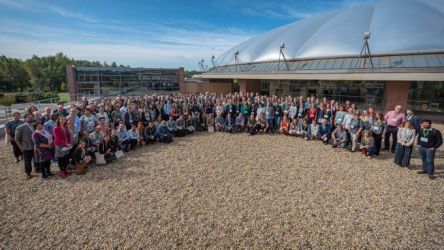The Diverfarming team participate in the ‘European Conference on Crop Diversification’ held in Budapest from the 18th to 21st of September
With the intention of exploring the potential for crop diversification to improve productivity, provide ecosystem services and make the value chains more sustainable and efficient, over 200 people attended the first European Conference on Crop Diversification held between the 18th and 21st of September in Budapest.
 The conference has been driven by the H2020 project on crop diversification DiverIMPACTS, whose coordinator, the researcher at the French National Institute for Agricultural Research Antoine Messéan, was responsible for inaugurating the event under the premise of “exploring how the transition can be achieved to diversify and maintain agrifood systems”. Accompanied by Dora Drexler from ÖMKI, the Research Institute for Organic Agriculture in Hungary, they opened three days involving 90 different oral communications and 75 posters during the 16 parallel sessions and five thematic workshops.
The conference has been driven by the H2020 project on crop diversification DiverIMPACTS, whose coordinator, the researcher at the French National Institute for Agricultural Research Antoine Messéan, was responsible for inaugurating the event under the premise of “exploring how the transition can be achieved to diversify and maintain agrifood systems”. Accompanied by Dora Drexler from ÖMKI, the Research Institute for Organic Agriculture in Hungary, they opened three days involving 90 different oral communications and 75 posters during the 16 parallel sessions and five thematic workshops.
The quantity and quality of the participation in the conference reflected how a stable community around the idea of crop diversification is gradually being formed, which is currently represented by the Crop Diversification Cluster formed by the DiverIMPACTS, Remix, TRUE Legumes, DIVERSify, LEGVALUE and Diverfarming projects, all funded through the H2020 call of the European Commission.
The Diverfarming team was present with 11 oral communications and eight posters on the topics researched to date. The researcher Claudia di Bene from CREA (Centre for Research on Agriculture and the Environment in Italy) presented the advances in the study of the positive effects on production and organic carbon sequestration of diversified herbaceous cropping systems in one of the sessions moderated by Jorge Álvaro Fuentes, also a member of Diverfarming. Jorge Álvaro Fuentes moreover presented the preliminary results of the study on greenhouse gas emissions in rotations of maize with legumes.
The project coordinator, Raúl Zornoza, presented the results of the organic combination of melon and cowpea as an option to improve productivity in the melon harvest in a parallel session. Zornoza also moderated, together with Sören Thiele – Bruhn (University of Trier), the session on microbial functional diversity of the soil improved by the diversification of the cropping system, in which Alessandra Trinchera (CREA), Luigi Orrù (CREA) and Felix Dittrich (University of Trier) also participated. The economic and social implications that adopting diversified crop systems may have were also covered by the Diverfarming researchers Francisco Alcón (Technical University of Cartagena) and Emanuele Blasi (University of Tucsia).
The working sessions also served to move forward in the study of the potential for crop diversification on both a social and economic level, and also environmentally as an ally against climate change. Cristina Castagnotto (Industrias David) moderated a working session related with innovations in technology applied to crop diversification. The congress finished with a field visit to two Hungarian vineyards, where the traditional vineyard is diversified with different species of pasture crops as green cover among the among vine alleys to improve the system’s environment quality, with increases in biodiversity and water and nutrient retention by the soil.
Diverfarming is a project financed by the Horizon 2020 Programme of the European Commission, within the challenge of “Food Security, Sustainable Agriculture and Forestry, Marine, Maritime and Inland Water Research and the Bioeconomy”, which counts on the participation of the Universities of Cartagena and Córdoba (Spain), Tuscia (Italy), Exeter and Portsmouth (United Kingdom), Wageningen (Netherlands), Trier (Germany), Pecs (Hungary) and ETH Zurich (Switzerland), the research centres Consiglio per la ricerca in agricoltura e l'analisi dell'economia agraria (Italy), the Consejo Superior de Investigaciones Científicas (Spain) and the Natural Resources Institute LUKE (Finland), the agrarian organisation ASAJA, and the companies Casalasco and Barilla (Italy), Arento, LogísticaDFM and Industrias David (Spain), Nieuw Bromo Van Tilburg and Ekoboerdeij de Lingehof (Netherlands), Weingut Dr. Frey (Germany), Nedel-Market KFT and Gere (Hungary) and Paavolan Kotijuustola and Polven Juustola (Finland).










